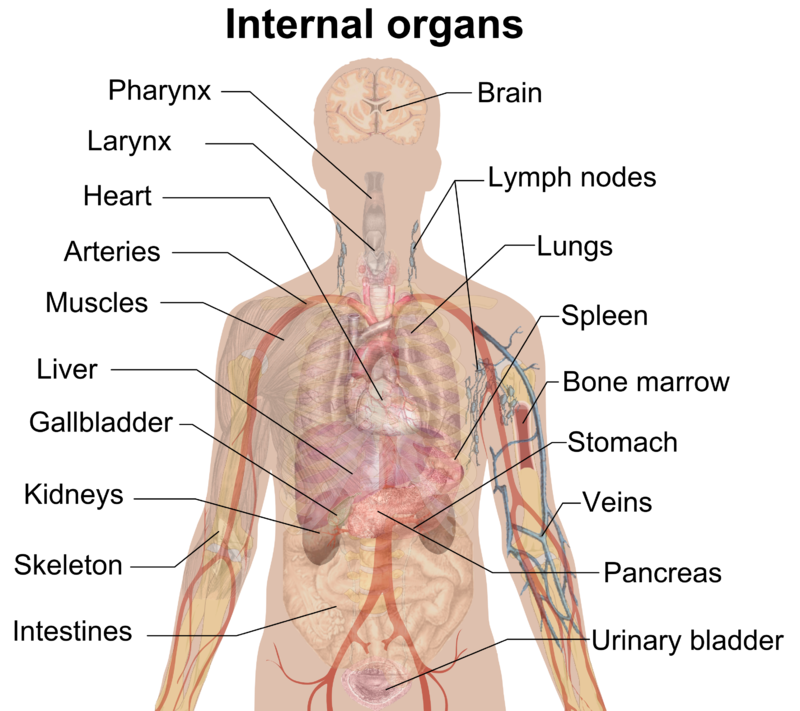Why Learn About Your Body’s Organs and Their Functions?
Knowing how your body works is the first step towards taking control of your health.
By understanding the specific functions of each organ, you can better appreciate the importance of maintaining a balanced diet and healthy lifestyle that supports optimal organ function.

Knowing how your body works isn’t just academic—it’s practical and empowering.
It helps you make informed decisions about your diet, lifestyle, and healthcare, allowing you to potentially prevent health issues before they arise.
Furthermore, understanding your body’s needs can lead to improved energy levels, stronger immune function, and enhanced overall well-being.
Our bodies are complex systems where each organ plays a critical role in maintaining our overall health and well-being.
Today, we’ll explore some of the key organs, their functions, and why they’re essential for our daily lives.
(See organ chart.)
1. Heart
Your heart is a muscular organ about the size of a fist, located just behind and slightly left of the breastbone. It pumps blood throughout the body via the circulatory system, supplying oxygen and nutrients to tissues and removing carbon dioxide and other wastes. [Heart Healthy Nutrition]
2. Lungs
Your lungs are vital for breathing. They work to take in oxygen when we inhale and expel carbon dioxide as we exhale. Located in the chest, these two sponge-like organs are crucial for gas exchange, influencing everything from energy levels to overall vitality. [Nutrition for Your Lungs]
3. Brain
Your brain is the control center of the body. It sits in the skull and oversees both conscious activities, like walking and talking, and unconscious processes, like breathing and heart rate. It processes a vast amount of information, helping to regulate bodily functions and enabling us to think, feel, and remember. [Nutrition for Your Brain]
4. Liver
Your liver, your body’s largest solid organ, plays an essential role in detoxifying chemicals and metabolizing drugs. It also makes proteins important for blood clotting and other functions. Located in the upper right part of the abdomen, the liver helps in storing nutrients and creating bile, which is necessary to digest and absorb nutrients efficiently. [Feed Your Liver]
5. Kidneys
Located in the lower back on either side of the spine, kidneys are responsible for filtering and removing waste from the body, balancing body fluids, and forming urine. They also play critical roles in regulating blood pressure, electrolyte balance, and red blood cell production. [Nutrition for Your Kidneys]
6. Stomach
Your stomach is a hollow organ that holds food while it is being mixed with stomach enzymes and acids. These digestive fluids continue the process of breaking down food into a usable form. Cells in the lining of the stomach secrete a strong acid and powerful enzymes that are responsible for the breakdown process. [Nutrition for Your Stomach]
7. Intestines
Your intestines are divided into two major parts: the small intestine and the large intestine. The small intestine absorbs nutrients and minerals from food, whereas the large intestine reabsorbs fluids and processes waste products from the body and prepares for its elimination. [Intestinal Health – Gut Check!]
8. Pancreas
Your pancreas plays a crucial role in digestion and glucose control. It produces enzymes that assist in the digestion of nutrients and releases hormones such as insulin, which regulates blood sugar levels. [Nutrition for Your Pancreas]
9. Skin
Often overlooked as an organ, your skin is the body’s largest organ and serves as a protective barrier against infection, regulates temperature, and provides sensory information. [Nutrition for Your Skin]
10. Gallbladder
Your gallbladder stores bile produced by the liver until it is needed for digesting fatty foods in the small intestine. [Nutrition for Your Gallbladder]
How Your Body Works
The organs mentioned in the overview above are some of the most essential and well-known in the human body. However, they are not all the organs that make up our body systems.
The human body has numerous other organs and organ systems, each with specific functions that contribute to overall health and well-being.
In addition to the major organs like the heart, lungs, brain, liver, kidneys, stomach, intestines, pancreas, skin, and gallbladder, there are other important organs and structures such as:
- Spleen: Helps filter blood and is part of the lymphatic system, playing a role in immune response.
- Thyroid: Produces hormones that regulate the body’s metabolic rate, heart and digestive function, muscle control, brain development, and bone maintenance.
- Adrenal glands: Produce hormones that help regulate metabolism, immune system, blood pressure, and response to stress.
- Bladder: Stores urine, allowing for urination to be infrequent and voluntary.
- Reproductive organs: Including the ovaries in females and testes in males, which produce hormones and cells necessary for reproduction.
The list in the initial post focuses on key organs that are fundamental in discussions about general health, nutrition, and well-being.
These organs often capture the primary focus because of their crucial roles in vital functions such as circulation, digestion, waste elimination, and regulation of body processes.
Other organs, though perhaps smaller or less frequently discussed, are also vital and contribute uniquely to the body’s overall functioning and health.
Each of these organs is integral to our health, and understanding their functions is the first step in learning how to nourish them properly. In the following series, we’ll explore each organ in detail, focusing on the best nutrients and foods to support their health.
How Your Body Works – Frequently Asked Questions
What is the most important organ in the human body?
While it’s difficult to label any single organ as the “most important,” since all organs have essential roles, the brain, heart, and lungs are often considered critical due to their fundamental functions in maintaining life. The brain controls bodily functions and cognitive abilities, the heart pumps blood to supply the entire body with nutrients and oxygen, and the lungs are crucial for breathing and oxygen exchange.
Can organs repair themselves?
Some organs have a remarkable ability to regenerate or repair themselves to a degree. For example, the liver can regenerate lost tissue, though it cannot recover completely from severe damage. The skin can heal itself after minor abrasions or cuts. However, organs like the heart and brain have very limited ability to repair themselves after significant damage.
How do lifestyle choices affect organ health?
Lifestyle choices such as diet, exercise, smoking, and alcohol consumption can significantly impact the health of your organs. For example, a balanced diet rich in fruits, vegetables, and lean proteins can support organ function, while high consumption of processed foods and alcohol can strain the liver. Regular exercise can improve heart health and help the respiratory system function better.
What are signs of organ distress or failure?
Symptoms of organ distress can vary widely depending on the organ involved but may include pain, fatigue, abnormal bleeding, swelling, changes in skin color, difficulty breathing, irregular heartbeat, and changes in body weight or appetite. Persistent or severe symptoms warrant a consultation with a healthcare provider.
How can I keep my organs healthy?
Maintaining organ health can be achieved through a combination of healthy eating, regular physical activity, adequate rest, stress management, and avoiding harmful substances like tobacco and excessive alcohol. Regular medical check-ups also play a crucial role in monitoring organ health and catching potential issues early.
Why is organ health crucial for overall health?
Each organ in the body has a specific function that contributes to the body’s overall operation. Poor health in any one organ can affect the entire system, leading to significant health issues. Keeping organs healthy helps ensure the body can perform all its functions properly, leading to a better quality of life.
Where can I learn more about the human anatomy?
Gray’s Anatomy is a reference book of human anatomy written by Henry Gray, illustrated by Henry Vandyke Carter and first published in London in 1858. It has had multiple revised editions and the current edition, the 42nd (October 2020), remains a standard reference, often considered “the doctors’ bible”. [Source: Wikipedia]
[Check out Gray’s Anatomy on Amazon here.]

By Mikael Häggström, used with permission. Image is in the public domain.
